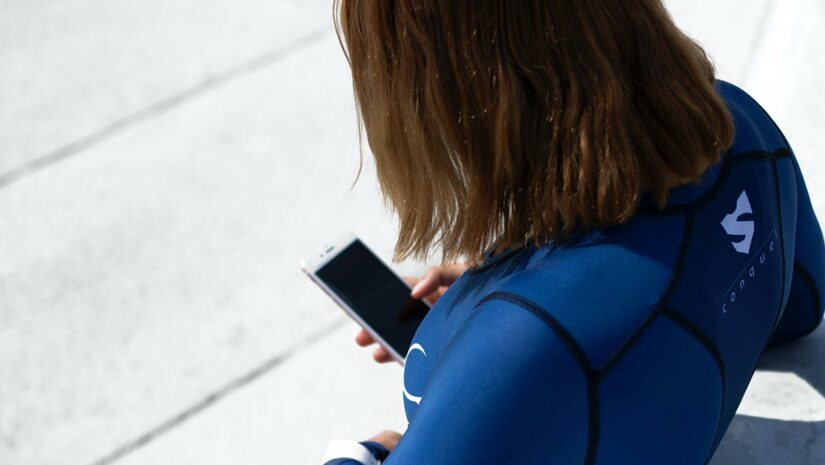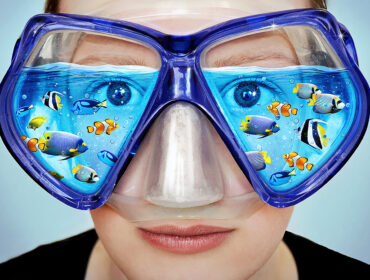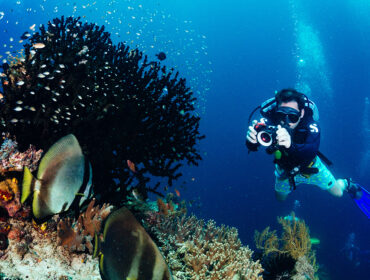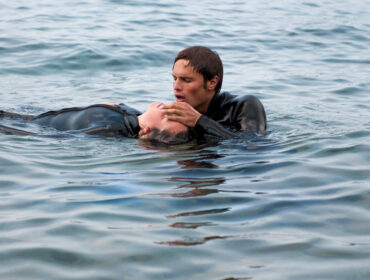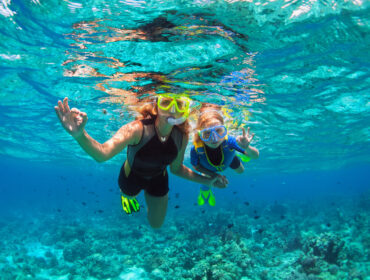Many women scuba divers are unsure as to whether they can continue to scuba dive once they get pregnant. Diving doctors get asked this question on a regular basis and it might surprise you that there hasn’t been in-depth research on the topic, but the resounding recommendation is to pause your diving schedule while pregnant.
What doctors tell us is that there is plenty of reason for caution, and erring on the side of caution is really what is best for the baby. Then again, that doesn’t mean that you have to swear off the water altogether. Let’s take a look at what we know are the pros and cons of pregnant women being in the water, as well as the reason why there is no conclusive evidence of the effects of scuba diving to a mother and her unborn baby.
Benefits of Being in the Water While Pregnant
Pregnant women do not often have the opportunity to feel weightless. The activity of swimming is capable of providing those luxuries while also providing a low-impact form of exercise. Aside from the obvious benefits of exercise, many women who exercise throughout pregnancy find it easier to get back into shape after the baby is born.
Being suspended in water also temporarily alleviates the aches and pains that pregnant women may be feeling, especially during the last trimester. Swollen joints will retain less water and sore muscles will feel a great deal of relief. The coolness of the water will also counteract sweat-inducing hormones, giving the pregnant mother a chance to feel better and fresher while in the water.
Perhaps the most special benefit is that when the mother starts to feel happy, it will have an emotionally positive effect on her growing fetus. The mother will release endorphins of a positive nature because she is doing an activity that she loves, which fetal development theorists believe may affect the personality and disposition of the child once they are born.
Suspected Dangers of Scuba Diving While Pregnant
So what suspected risks would submerging deeper than a few feet pose to a developing baby? Research has explored the topic of diving and pregnancy in some parts.
Unfortunately, data is limited on the subject and gathering information is difficult. No one wants to put their unborn child at risk, so information is collected through surveys of women divers, or controlled studies of lab animals. Using hyperbaric chambers, scientists are able to simulate the pressurized environment of diving in an attempt to gather this data.
For starters, there is the issue of nitrogen dissolution and its theoretical risks for fetal injury. Because an unborn baby receives the oxygen it needs to live from the placenta, the baby is bound to feel the effects of decompression sickness when the mother ends up suffering from it after diving at great depths. Its underdeveloped lungs cannot filter bubbles the way fully developed human lungs do, so those formed bubbles could reach a vital organ and potentially cause fetal complications.
Similarly, when the pregnant woman suffers from carbon monoxide poisoning, she will also have to be treated in a hyperbaric chamber because the unborn baby is more sensitive to the toxin.
Medical experts would also like to warn pregnant mothers about the psychological dangers that can result from a miscarriage following a dive. Even if the miscarriage is not a direct result of scuba diving (since miscarriages are not that uncommon), there is a risk for self-blame and anguish if the mother ends up thinking that it is her fault.
Other Risks
Even if there were no risks to the fetus, women experience many physiological changes that may interfere with diving. Swelling of the sinuses and mucous membranes could affect ear clearing, while morning sickness and nausea would certainly make boat dives unpleasant. A growing abdomen would mean not being able to wear your regular wetsuit, BCD, or weight belt. The buoyancy skills you have worked to hone and fine tune would be thrown off by the changes in your body shape and weight. Ill-fitting gear could pose a safety risk in itself.
Lack of Conclusive Evidence
As stated at the beginning of the article, there is no conclusive evidence that scuba diving is bad for mother and fetus, because it simply isn’t ethical to conduct studies on pregnant women.
Most animal experiments focusing on this issue have not conclusively shown that breathing air that is concentrated by pressure can increase the risk of abnormal development or pregnancy loss, but tests done on sheep reveal that bubbles do begin to form in the fetus at one-half of the maximum bottom time.
Animal experiments to determine the risks of pregnancy and diving have been conducted with both first and third trimester pregnancies. These have shown an increased risk of miscarriage, premature delivery, or developmental birth defects such as abnormal heart development or malformed limbs. Signs of decompression sickness and bubbles forming in amniotic fluid were other side effects of the hyperbaric simulations. Comparing the animal data to a human pregnancy, the fetal risks of third trimester diving by a pregnant woman include congestive heart failure as well as stillbirth.
Possible associated risks include low birth weight, birth defects, and neonatal respiratory problems. If it’s risky for an animal, it hardly seems worth the risk to the life of your own baby.
Make Safety a Priority
Because of the above-mentioned risks that may be associated with diving, snorkeling at shallower depths (with your doctor’s go signal) would be a great way to come to a compromise so you still get that underwater experience.
Of course, only your doctor can provide you with the most accurate information that is unique to you. The Divers Alert Network (DAN) also says you shouldn’t scuba dive while pregnant. This article only intends to shed some light on the subject, as it is one we happen to hear fairly often. And if you find out after diving that you’re pregnant, know that there is no medical proof suggesting that you should worry about your baby’s health or consider terminating the pregnancy.
Conclusion
Bottom line, with limited data available, a female diver is best advised to confer closely with her obstetrician, and to defer diving until after giving birth. If you went diving and then later discovered your were pregnant at that time, don’t panic. There is some anecdotal evidence from women who successfully dove without complications to their pregnancies. Tell your doctor so you can be monitored accordingly. The water is not totally off limits! Most women are still able to enjoy swimming and snorkeling at the surface for the duration of their pregnancies.
As with any other activity that you would undertake while you are pregnant, just be aware of the risks and make safety your number one priority.

